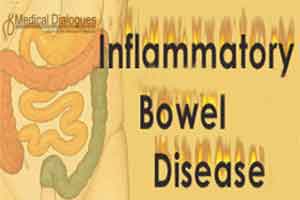- Home
- Editorial
- News
- Practice Guidelines
- Anesthesiology Guidelines
- Cancer Guidelines
- Cardiac Sciences Guidelines
- Critical Care Guidelines
- Dentistry Guidelines
- Dermatology Guidelines
- Diabetes and Endo Guidelines
- Diagnostics Guidelines
- ENT Guidelines
- Featured Practice Guidelines
- Gastroenterology Guidelines
- Geriatrics Guidelines
- Medicine Guidelines
- Nephrology Guidelines
- Neurosciences Guidelines
- Obs and Gynae Guidelines
- Ophthalmology Guidelines
- Orthopaedics Guidelines
- Paediatrics Guidelines
- Psychiatry Guidelines
- Pulmonology Guidelines
- Radiology Guidelines
- Surgery Guidelines
- Urology Guidelines
Smoking may cause inflammatory bowel disease

A new study shows a direct effect of cigarette smoke on intestinal inflammation for the first time. Researchers in South Korea report that exposing mice to cigarette smoke results in colitis, an inflammation of the colon resembling Crohn's disease, and identify a specific white blood cell and inflammatory protein responsible for this effect. The study, published today in open-access journal Frontiers in Immunology, could help scientists to develop new treatments for inflammatory bowel diseases such as Crohn's disease, and increase awareness among smokers of their risk for colitis.
Previous research shows that smoking significantly increases the risk of Crohn's disease, an inflammatory bowel disease. However, the mechanism by which cigarette smoke affects the gastrointestinal system was not known. One possibility is that inflammation in the lungs caused by smoking could have a knock-on effect in the intestine.
"The airways and the intestinal system have a lot in common," says Hyunsu Bae, of Kyung Hee University in South Korea. "Interestingly, in Traditional Korean Medicine, a connection between the lung and the large intestine has long been emphasized. Crohn's disease is more likely to occur in people with airway diseases, suggesting that inflammation in the lungs is linked to inflammation in the gut."
To investigate this possibility, Bae and colleagues exposed mice to smoke twenty cigarettes a day, six days a week, for a few weeks. The researchers then examined the presence of inflammation in the mice's lungs and colons.
Unsurprisingly, compared with mice exposed to clean air, mice exposed to cigarette smoke showed significant inflammation in their lungs. Interestingly, they also suffered from a type of colitis resembling Crohn's disease. The researchers found increased levels of mucus and inflammation in the colon, and blood in the feces of the smoke-exposed mice. They also found increased levels of CD4+ T cells, a type of white blood cell, which was releasing a pro-inflammatory protein called interferon-gamma.
The team next investigated whether these white blood cells and inflammatory protein were responsible for the smoke-induced colitis. They repeated the experiment with mice that had very few CD4+ T cells and mice that couldn't produce interferon-gamma. In both cases, the mice did not develop colitis when exposed to cigarette smoke.
The team was now confident that CD4+ T cells were responsible for the cigarette smoke-induced colitis, but weren't sure if it was possible for these white blood cells to be activated by cigarette smoke in the lungs, and then travel to the colon to cause colitis.
To test this, the researchers exposed mice to cigarette smoke, and then isolated CD4+ T cells from tissue near their lungs. They then injected the cells into mice that had never been exposed to smoke. Strikingly, the injected cells migrated to the colon, and the non-smoke-exposed mice developed colitis shortly after.
"Our results suggest that cigarette smoking activates specific white blood cells in the lung, which might later move to the colon, triggering bowel inflammation," explains Jinju Kim, another researcher involved in the study. "Smokers, especially those who also have bowel disease, should reduce their smoking." The findings could also help scientists to develop new treatments for Crohn's disease.
For more details click on the link: http://dx.doi.org/10.3389/fimmu.2017.01344

Disclaimer: This site is primarily intended for healthcare professionals. Any content/information on this website does not replace the advice of medical and/or health professionals and should not be construed as medical/diagnostic advice/endorsement or prescription. Use of this site is subject to our terms of use, privacy policy, advertisement policy. © 2020 Minerva Medical Treatment Pvt Ltd